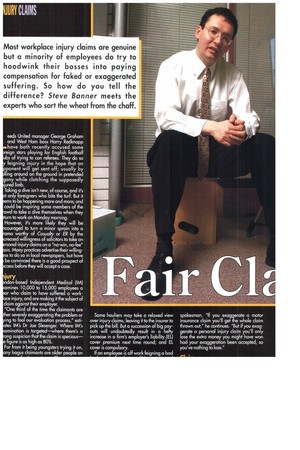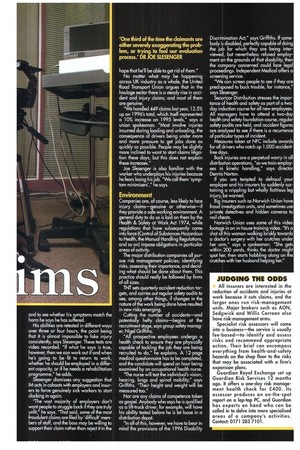Most workplace injury claims are genuine but a minority of
Page 52

Page 53

If you've noticed an error in this article please click here to report it so we can fix it.
employees do try to hoodwink their bosses into paying compensation for faked or exaggerated suffering. So how do you tell the difference? Steve Banner meets the experts who sort the wheat from the chaff.
eeds United manager George Graham and West Ham boss Harry Redknapp have both recently accused some reign stars playing for English football ubs of trying to con referees. They do so y feigning injury in the hope that an pponent will get sent off; usually by Ifing around on the ground in pretended gony while clutching the supposedly jured limb. Taking a dive isn't new, of course, and it's t only foreigners who bite the turf. But it ms to be happening more and more; and could be inspiring some members of the owd to take a dive themselves when they turn to work on Monday morning.
However, it's more likely they will be couraged to turn a minor sprain into a ama worthy of Casuahy or ER by the creased willingness of solicitors to take on rsonal-injury claims on a "no-win, no-fee" sis. Many practices advertise their willingss to do so in local newspapers, but have be convinced there is a good prospect of cess before they will accept a case
fury
ndon-based Independent Medical (IM) amines 10,000 to 15,000 employees a r who claim to have suffered a workace injury, and are making it the subject of claim against their employer. "One third of the time the claimants are ther severely exaggerating the problem or ing to fool our evaluation process," estiates IM's Dr Joe Slesenger. Where IM's amination is targeted—where there's a ong suspicion that the claim is specious— e figure is as high as 80%. Far from it being youngsters trying it on, any bogus claimants are older people on
Some hauliers may take a relaxed view over injury claims, leaving it to the insurer to pick up the bill. But a succession of big payouts will undoubtedly result in a hefty increase in a firm's employer's liability (EL) cover premium next time round; and EL cover is compulsory.
If an emplo ee is off work feigning a bad spokesman. "If you exaggerate a motor insurance claim you'll get the whole claim thrown out," he continues. "But if you exaggerate a personal injury claim you'll only lose the extra money you might have won had your exaggeration been accepted, so you've nothing to lose." and to see whether his symptoms match the harm he says he has suffered.
His abilities are retested in different ways over three or four hours, the point being that it is almost impossible to fake injury consistently, says Slesenger. These tests are video recorded. "If what he says is true, however, then we can work out if and when he's going to be fit to return to work, whether he should be employed in a differeat capacity, or if he needs a rehabilitation programme," he adds.
Slesenger dismisses any suggestion that IM acts in cahoots with employers and insurers to force genuinely sick workers to start clocking in again. 'The vast majority of employers don't want people to struggle back it they are truly unfit," he says. "That said, some of the most fraudulent claims are filed by 'difficult' members of staff, and the boss may be willing to support their damn rather than reject it in the hope that he'll be able to get rid of them." No matter what may be happening across UK industry as a whole, the United Road Transport Union argues that in the haulage sector there is a steady rise in accident and injury claims; and most of them are genuine. "We handled 449 claims last year, 1 2.5% up on 1996's total, which itself represented a 10% increase on 1995 levels," says a union spokesman. "Most involve injuries incurred during loading and unloading, the consequence of drivers being under more and more pressure to get jobs done as quickly as possible. People may be slightly more inclined to want to start claims litigation these days, but this does not explain these increases."
Joe Slesenger is also familiar with the worker who underplays his injuries because he fears losing his job. 'We call them 'symptom minimisers'," he says.
Environment
Companies are, of course, less likely to face injury claims—genuine or otherwise—if they provide a safe working environment. A general duty to do so is laid on them by the Health & Safety at Work Act 1974, while regulations that have subsequently come into force (Control of Substances Hazardous to Health, the Manual Handling Regulations, and so on) impose obligations in particular areas of activity.
The major distribution companies all pursue risk management policies; identifying risks, assessing their importance, and deciding what should be done about them. This practice should really be followed by firms of all sizes.
TNT sets quarterly accident reduction targets, and carries out regular safety audits to see, among other things, if changes in the nature of the work being done have resulted in new risks emerging. Cutting the number of accidents—and potentially hefty claims—begins at the recruitment stage, says group safety manager, Nigel Griffiths.
"All prospective employees undergo a health check to ensure they are physically capable of tackling the job they are being recruited to do," he explains. A 12 page medical questionnaire has to be completed, and the candidate will spend an hour being examined by an occupational health nurse. "The nurse will test the individual's vision, hearing, lungs and spinal mobility," says Griffiths. "Their height and weight will be measured too."
Nor are any claims of competence taken as gospel. Anybody who says he is qualified as a lift-truck driver, for example, will have his ability tested before he is let loose in a distribution depot. "In all of this, however, we have to bear in mind the provisions of the 1996 Usability
Discrimination Act," says Griffiths. If somebody is disabled, perfectly capable of doing the job for which they are being interviewed, but nevertheless refused employment on the grounds of that disability, then the company concerned could face legal proceedings. Independent Medical offers a screening service.
"We can screen people to see if they are predisposed to back trouble, for instance," says Slesenger. Securicor Distribution stresses the importance of health and safety as part of a twoday induction course for all new employees. All managers have to attend a two-day health and safety foundation course, regular safety audits are held, and accident figures are analysed to see if there is a recurrence of particular types of incident. Measures taken at NFC include awards for all drivers who notch up 1,000 accidentfree days. Bock injuries are a perpetual worry in all distribution operations, "so we train employees in kinetic handling," says director Dennis Norton.
If you are tempted to defraud your employer and his insurers by suddenly sustaining a crippling but wholly fictitious leg iniury, be warned. Big insurers such as Norwich Union have fraud investigation units, and sometimes use private detectives and hidden cameras to nail cheats.
Norwich Union uses some of this video footage in an in-house training video. "It's a shot of this woman walking briskly towards a doctor's surgery with her crutches under her arm," says a spokesman. "She gets within 200 yards, thinks the doctor might spot her, then starts hobbling along on the crutches with her husband helping her."
JUDGING THE ODDS
All insurers are interested in the reduction of accidents and injuries at work because it cuts claims, and the larger ones run risk-management units. Major brokers such as AON, Sedgwick and Willis Corroon also have risk-management arms.
Specialist risk assessors will come into a business—the service is usually fee-based—to identify and assess risks and recommend appropriate action. Their brief can encompass everything from health-and-safety hazards on the shop floor to the risks that may be associated with a firm's expansion plans.
Guardian Royal Exchange set up Guardian Risk Services 12 months ago. It offers a one-day risk management health check for £400. Its assessor produces an on-the-spot report on a lap-top PC, and Guardian has experts on hand who can be called in to delve into more specialised areas of a company's activities. Contact: 0171 283 7101.




















































































































